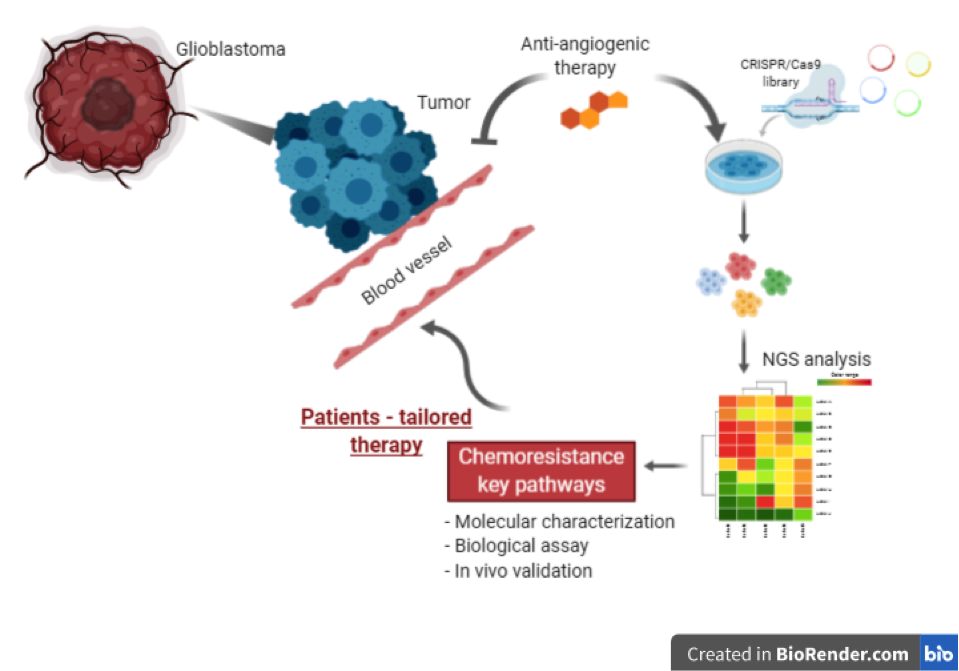Group Leader : Maria Laura Falchetti
Topic: Molecular oncology and pathology
The research focus of our lab is the brain tumor glioblastoma (GBM). Our research has evolved over time, but the characterizing red trail has always been GBM. We studied different aspects, some dealing with GBM tumor biology, others are therapy-oriented. GBM is the most aggressive brain tumor in the adults, and, despite all the efforts spent by the scientific community, its prognosis remains poor, with a median survival at diagnosis of about 14 months. The main histological features of GBM tumors are massive necrosis and prominent angiogenesis. Angiogenesis represents a distinctive peculiarity of GBM, and a landmark for diagnosis. Anti-angiogenic treatments targeting tumor vasculature are considered the new frontier in GBM therapy but, unfortunately, they are substantially disappointing the expectations. The most recent research published by our group characterizes GBM tumor response to the anti-angiogenic drug axitinib. We demonstrated that this small tyrosine kinase inhibitor triggers cell senescence in both tumor as well as endothelial cells, but according to different molecular mechanisms. This finding opens the way to tumor cell-specific treatments and our future will be strongly oriented in this direction. We are currently launching a molecular study for unravelling the molecular mechanisms of GBM response to regorafenib, a multikinase inhibitor which is performing well in relapsed GBM patients. Further, we are participating in an ongoing study on the possibility of using functionalized liposomes as specific delivery vehicles to central nervous system for gene therapy.

Key Pubblications
Falchetti ML et al (2003). Glioblastoma induces vascular endothelial cells to express telomerasein vitro. Cancer Res 63(13):3750-4. PMID: 12839970
Pallini R et al (2006). Telomerase inhibition by stable RNA interference impairs tumor growthand angiogenesis in glioblastoma xenografts. Int J Cancer doi: 10.1002/ijc.21613
Pacioni S et al (2017). Human mesenchymal stromal cells inhibit tumor growth in orthotopicglioblastoma xenografts. Stem Cell Res Ther (doi: 10.1186/s13287-017-0516-3).
Mongiardi MP et al (2019.) Axitinib exposure triggers endothelial cells senescence through ROSaccumulation and ATM activation. Oncogene (doi: 10.1038/s41388-019-0798-2.)
Pacioni S et al (2019). Brain Invasion along Perivascular Spaces by Glioma Cells: Relationshipwith Blood-Brain Barrier. Cancers (doi: 10.3390/cancers12010018)
Research Group

Researchers:
Maria Patrizia Mongiardi
email. mariapatrizia.mongiardi@cnr.it
tel. 06 90091401
Andrea Levi
email. andrea.levi@cnr.it
tel. 06 90091489
Post-doctoral fellows:
Maurizia Piras
email. maurizia.piras@ibbc.cnr.it
tel. 06 90091467
Graduate student:
Matilde Merolle
email. matildemerolle@live.it
tel.06 90091467
Collaborators:
Prof. Roberto Pallini (Università Cattolica del Sacro Cuore)
Dott.ssa Lucia Ricci Vitiani (Istituto Superiore di Sanità)
Prof.ssa Manuela Helmer Citterich (Università di Tor Vergata)
Dott.ssa Giovanna Mancini (Istituto per i Sistemi Biologici-CNR)
Dott.ssa Manuela Pellegrini
